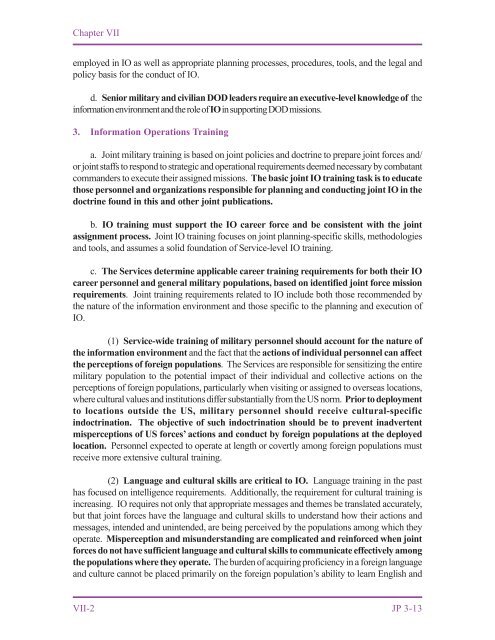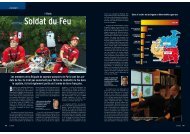Joint Publication 3-13, Information Operations - The Global ...
Joint Publication 3-13, Information Operations - The Global ...
Joint Publication 3-13, Information Operations - The Global ...
Create successful ePaper yourself
Turn your PDF publications into a flip-book with our unique Google optimized e-Paper software.
Chapter VII<br />
employed in IO as well as appropriate planning processes, procedures, tools, and the legal and<br />
policy basis for the conduct of IO.<br />
d. Senior military and civilian DOD leaders require an executive-level knowledge of the<br />
information environment and the role of IO in supporting DOD missions.<br />
3. <strong>Information</strong> <strong>Operations</strong> Training<br />
a. <strong>Joint</strong> military training is based on joint policies and doctrine to prepare joint forces and/<br />
or joint staffs to respond to strategic and operational requirements deemed necessary by combatant<br />
commanders to execute their assigned missions. <strong>The</strong> basic joint IO training task is to educate<br />
those personnel and organizations responsible for planning and conducting joint IO in the<br />
doctrine found in this and other joint publications.<br />
b. IO training must support the IO career force and be consistent with the joint<br />
assignment process. <strong>Joint</strong> IO training focuses on joint planning-specific skills, methodologies<br />
and tools, and assumes a solid foundation of Service-level IO training.<br />
c. <strong>The</strong> Services determine applicable career training requirements for both their IO<br />
career personnel and general military populations, based on identified joint force mission<br />
requirements. <strong>Joint</strong> training requirements related to IO include both those recommended by<br />
the nature of the information environment and those specific to the planning and execution of<br />
IO.<br />
(1) Service-wide training of military personnel should account for the nature of<br />
the information environment and the fact that the actions of individual personnel can affect<br />
the perceptions of foreign populations. <strong>The</strong> Services are responsible for sensitizing the entire<br />
military population to the potential impact of their individual and collective actions on the<br />
perceptions of foreign populations, particularly when visiting or assigned to overseas locations,<br />
where cultural values and institutions differ substantially from the US norm. Prior to deployment<br />
to locations outside the US, military personnel should receive cultural-specific<br />
indoctrination. <strong>The</strong> objective of such indoctrination should be to prevent inadvertent<br />
misperceptions of US forces’ actions and conduct by foreign populations at the deployed<br />
location. Personnel expected to operate at length or covertly among foreign populations must<br />
receive more extensive cultural training.<br />
(2) Language and cultural skills are critical to IO. Language training in the past<br />
has focused on intelligence requirements. Additionally, the requirement for cultural training is<br />
increasing. IO requires not only that appropriate messages and themes be translated accurately,<br />
but that joint forces have the language and cultural skills to understand how their actions and<br />
messages, intended and unintended, are being perceived by the populations among which they<br />
operate. Misperception and misunderstanding are complicated and reinforced when joint<br />
forces do not have sufficient language and cultural skills to communicate effectively among<br />
the populations where they operate. <strong>The</strong> burden of acquiring proficiency in a foreign language<br />
and culture cannot be placed primarily on the foreign population’s ability to learn English and<br />
VII-2<br />
JP 3-<strong>13</strong>



